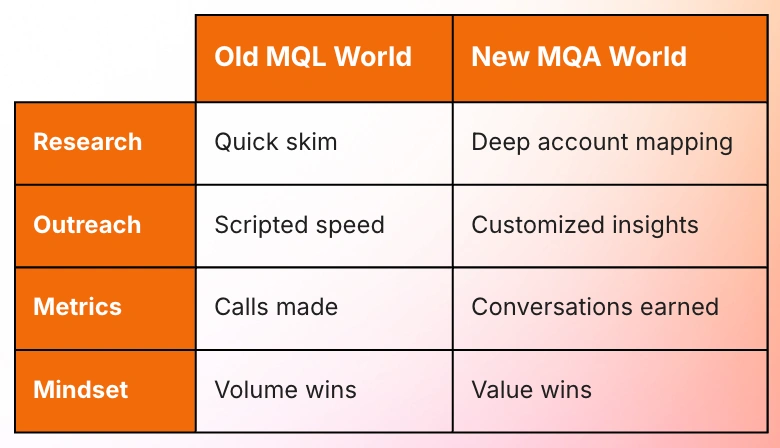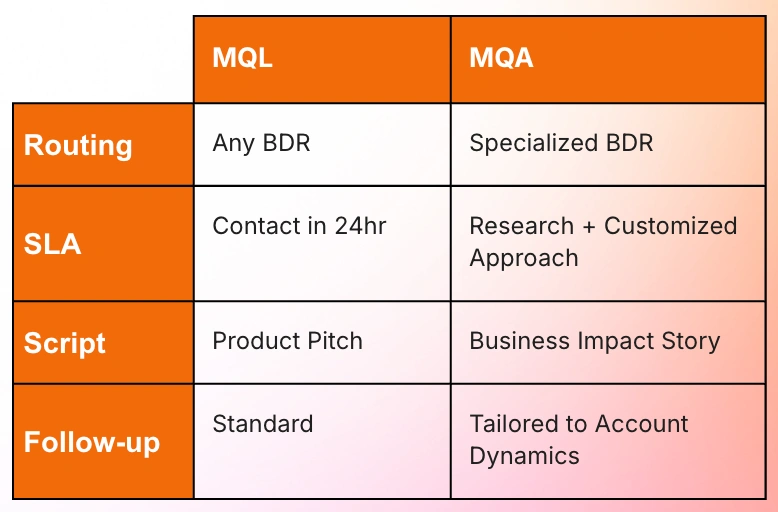MQL detox: Get sales hooked on quality MQAs
“Digital Transformation” was the darling of demand generation for a lot of companies in the past decade, but so many of them got it wrong. Big changes to your B2B marketing practice takes a serious commitment to change management. Without change management, a lot of processes are put on paper, but never make it off the shelf. Change is hard. Change means getting out of our comfort zone - but this is also the place where we have the opportunity to experience the most growth. Transitioning from MQLs to MQAs requires change management.
.svg)

In partnership with:
Featuring
Featuring
How are you going to stand out in 2026?
Buyers are in control of the buying process. Over 70% of it is happening online. And they are putting companies on their short list of vendors that provide value and establish trust with their content.
How are you accounting for this in your 2026 strategy?
You need to stand out. To make sure your buyers notice you. Let us help you build that into your strategy for next year -->
%20(1).webp)
The Revenue Marketer

MQL detox: Get sales hooked on quality MQAs
Still chasing 10% efficiency gains?
2023-2025 were the years of experimentation with AI. 2026 is the year to make it transformative. If you're still trying to figure out the strategic advantage AI will bring to your team, we're here to help!
So here we are. We’ve defined what an MQA means to our organization and we have had the crucial conversations about how our MQL addiction hasn’t delivered on its promises. Most addictions don’t. How do we take our strategy from paper to actualization and build rigor around this new process? If you’re still bridging that gap, our MQL detox framework can help guide your shift from traditional lead obsession to account-based precision—with real steps to replace quantity-driven habits with quality-focused impact.
Our assumption is that you worked with Sales in designing your MQA process - from the definition of what qualifies as an MQA to how both sales and marketing will act on that information. (If you haven't worked with Sales, do not pass go. In fact, go back two spaces to this article, where we talk about marketing and sales alignment). If you included sales in designing your new MQA process - you have taken the first most important step to adoption.
Pending you did things right (of course you did!), sales should already feel a sense of ownership about the MQA process, they should have in fact - have helped to design it. They want it to work. There are going to be a few sales reps who want for it to work more than others. These are the risk takers on your team. They aren’t afraid to try new things if it will get them to the money. Find these sales reps. They are going to be your MQA champions and also the beta testers for your pilot.
Now, let's get tactical on bringing this MQA vision to life:
Marketing's Role: You’re Not Off the Hook
Passing an MQA to Sales isn’t a mic-drop moment. It's a baton handoff—and you’re still running the relay.
MQAs are about buying committees, not single contacts. If Sales is working the front door, Marketing should be working the windows, side entrances, and back gates. Full surround-sound engagement.
Stratosync got this right (name changed to protect the innocent). As soon as priority accounts hit MQA status, Marketing flooded the zone: targeted display ads, personalized content hubs, industry webinars—all tuned to the pain points uncovered in their research.
And they didn’t stop there.
When Sales flagged an account moving into serious evaluation? Marketing launched competitive comparison content to all known contacts. New buying committee member shows up? They were immediately dropped into personalized nurture streams. Opportunity went quiet? Marketing hit them with “wake the dead” campaigns featuring fresh wins and third-party validation.
In this model, Marketing isn’t supporting Sales—they’re co-owning the close. That’s the essence of getting sales hooked on MQAs: building a system where both teams share accountability for driving pipeline momentum and celebrating joint wins.
Shared Success Criteria: Set the Rules Before You Play
You can’t call an MQA pilot a success if nobody agrees on what success looks like.
At Stratosync, Marketing and Sales sat down before launch to nail it down:
- How deep was engagement across the account?
- How did Sales rate MQA quality?
- How many MQAs turned into real opportunities?
- Did MQAs move faster than old-school MQLs?
- How much revenue did they actually touch?
No fuzzy metrics. No excuses. Just mutual accountability.
Feedback Loops: Fix the Broken Stuff Fast
When you’re building something new, slow feedback is a silent killer.
Stratosync stayed ahead of the curve with:
- Weekly quickfire standups (Marketing + BDRs)
- Bi-weekly reviews with Sales leaders
- Monthly "what's working, what's not" summits
- A dedicated Slack channel for instant feedback
This meant small problems stayed small—and pilots didn’t spiral into months of wasted effort.
BDR Enablement: Rewire the Machine
Slapping a new acronym on leads won’t fix anything if your BDRs are still running the same old playbook.
At Stratosync, BDRs shifted from spray-and-pray to surgical strikes:

They also re-engineered incentives. No more $500 for burning through 100 MQLs. Now bonuses stacked based on actual progression:
- Engage a decision-maker? $50
- Engage the buying committee? +$100
- Hit proposal stage? +$200
Show me the behavior you reward, and I’ll show you the outcomes you get.
If you’re looking to create this same level of alignment and consistency, our transition to high quality MQAs guide breaks down how to operationalize this shift across marketing, sales, and operations—with the exact frameworks, metrics, and templates to get started.
Systems That Sing
If your CRM still thinks MQLs are king, you’re going to have a bad time. Stratosync overhauled Salesforce to:
- Recognize and route MQAs separately
- Track buying committee engagement visually
- Auto-trigger tasks when high-intent signals pop
And they kept room for human judgment: a “Hot Signal” manual workflow, letting reps fast-track real-world intel that wouldn’t score on paper.
Remember: automation is great—but awareness closes deals.
Piloting the Right Way: Not a Science Fair Project
A pilot isn’t a “nice to have.” It's your survival strategy. Stratosync nailed their pilot by getting very specific:
- Duration: 60 days
- Teams: 5 Enterprise BDRs + 3 Vertical AEs
- Accounts: 50 big-dollar manufacturing firms
- Control Group: Traditional MQL process
And everyone had the same playbook:

They tracked every moment from first signal to close—because pilots aren't about feeling good. They're about finding the truth
Final Thought:
Breaking up with MQLs isn't just about a new funnel stage. It’s about building a revenue engine that’s smarter, faster, and built for real buying behavior—not hope.
Is it hard? Hell yes. Is it worth it? Absolutely.
Because "good enough" MQLs aren't going to hit next quarter’s numbers. And your competitors are already starting their detox.
Better to lead the way.
About the author
Service page feature

Demand gen
So here we are. We’ve defined what an MQA means to our organization and we have had the crucial conversations about how our MQL addiction hasn’t delivered on its promises. Most addictions don’t. How do we take our strategy from paper to actualization and build rigor around this new process? If you’re still bridging that gap, our MQL detox framework can help guide your shift from traditional lead obsession to account-based precision—with real steps to replace quantity-driven habits with quality-focused impact.
Our assumption is that you worked with Sales in designing your MQA process - from the definition of what qualifies as an MQA to how both sales and marketing will act on that information. (If you haven't worked with Sales, do not pass go. In fact, go back two spaces to this article, where we talk about marketing and sales alignment). If you included sales in designing your new MQA process - you have taken the first most important step to adoption.
Pending you did things right (of course you did!), sales should already feel a sense of ownership about the MQA process, they should have in fact - have helped to design it. They want it to work. There are going to be a few sales reps who want for it to work more than others. These are the risk takers on your team. They aren’t afraid to try new things if it will get them to the money. Find these sales reps. They are going to be your MQA champions and also the beta testers for your pilot.
Now, let's get tactical on bringing this MQA vision to life:
Marketing's Role: You’re Not Off the Hook
Passing an MQA to Sales isn’t a mic-drop moment. It's a baton handoff—and you’re still running the relay.
MQAs are about buying committees, not single contacts. If Sales is working the front door, Marketing should be working the windows, side entrances, and back gates. Full surround-sound engagement.
Stratosync got this right (name changed to protect the innocent). As soon as priority accounts hit MQA status, Marketing flooded the zone: targeted display ads, personalized content hubs, industry webinars—all tuned to the pain points uncovered in their research.
And they didn’t stop there.
When Sales flagged an account moving into serious evaluation? Marketing launched competitive comparison content to all known contacts. New buying committee member shows up? They were immediately dropped into personalized nurture streams. Opportunity went quiet? Marketing hit them with “wake the dead” campaigns featuring fresh wins and third-party validation.
In this model, Marketing isn’t supporting Sales—they’re co-owning the close. That’s the essence of getting sales hooked on MQAs: building a system where both teams share accountability for driving pipeline momentum and celebrating joint wins.
Shared Success Criteria: Set the Rules Before You Play
You can’t call an MQA pilot a success if nobody agrees on what success looks like.
At Stratosync, Marketing and Sales sat down before launch to nail it down:
- How deep was engagement across the account?
- How did Sales rate MQA quality?
- How many MQAs turned into real opportunities?
- Did MQAs move faster than old-school MQLs?
- How much revenue did they actually touch?
No fuzzy metrics. No excuses. Just mutual accountability.
Feedback Loops: Fix the Broken Stuff Fast
When you’re building something new, slow feedback is a silent killer.
Stratosync stayed ahead of the curve with:
- Weekly quickfire standups (Marketing + BDRs)
- Bi-weekly reviews with Sales leaders
- Monthly "what's working, what's not" summits
- A dedicated Slack channel for instant feedback
This meant small problems stayed small—and pilots didn’t spiral into months of wasted effort.
BDR Enablement: Rewire the Machine
Slapping a new acronym on leads won’t fix anything if your BDRs are still running the same old playbook.
At Stratosync, BDRs shifted from spray-and-pray to surgical strikes:

They also re-engineered incentives. No more $500 for burning through 100 MQLs. Now bonuses stacked based on actual progression:
- Engage a decision-maker? $50
- Engage the buying committee? +$100
- Hit proposal stage? +$200
Show me the behavior you reward, and I’ll show you the outcomes you get.
If you’re looking to create this same level of alignment and consistency, our transition to high quality MQAs guide breaks down how to operationalize this shift across marketing, sales, and operations—with the exact frameworks, metrics, and templates to get started.
Systems That Sing
If your CRM still thinks MQLs are king, you’re going to have a bad time. Stratosync overhauled Salesforce to:
- Recognize and route MQAs separately
- Track buying committee engagement visually
- Auto-trigger tasks when high-intent signals pop
And they kept room for human judgment: a “Hot Signal” manual workflow, letting reps fast-track real-world intel that wouldn’t score on paper.
Remember: automation is great—but awareness closes deals.
Piloting the Right Way: Not a Science Fair Project
A pilot isn’t a “nice to have.” It's your survival strategy. Stratosync nailed their pilot by getting very specific:
- Duration: 60 days
- Teams: 5 Enterprise BDRs + 3 Vertical AEs
- Accounts: 50 big-dollar manufacturing firms
- Control Group: Traditional MQL process
And everyone had the same playbook:

They tracked every moment from first signal to close—because pilots aren't about feeling good. They're about finding the truth
Final Thought:
Breaking up with MQLs isn't just about a new funnel stage. It’s about building a revenue engine that’s smarter, faster, and built for real buying behavior—not hope.
Is it hard? Hell yes. Is it worth it? Absolutely.
Because "good enough" MQLs aren't going to hit next quarter’s numbers. And your competitors are already starting their detox.
Better to lead the way.
Resources
About the author
Service page feature

Demand gen
MQL detox: Get sales hooked on quality MQAs

Speakers
Other helpful resources
So here we are. We’ve defined what an MQA means to our organization and we have had the crucial conversations about how our MQL addiction hasn’t delivered on its promises. Most addictions don’t. How do we take our strategy from paper to actualization and build rigor around this new process? If you’re still bridging that gap, our MQL detox framework can help guide your shift from traditional lead obsession to account-based precision—with real steps to replace quantity-driven habits with quality-focused impact.
Our assumption is that you worked with Sales in designing your MQA process - from the definition of what qualifies as an MQA to how both sales and marketing will act on that information. (If you haven't worked with Sales, do not pass go. In fact, go back two spaces to this article, where we talk about marketing and sales alignment). If you included sales in designing your new MQA process - you have taken the first most important step to adoption.
Pending you did things right (of course you did!), sales should already feel a sense of ownership about the MQA process, they should have in fact - have helped to design it. They want it to work. There are going to be a few sales reps who want for it to work more than others. These are the risk takers on your team. They aren’t afraid to try new things if it will get them to the money. Find these sales reps. They are going to be your MQA champions and also the beta testers for your pilot.
Now, let's get tactical on bringing this MQA vision to life:
Marketing's Role: You’re Not Off the Hook
Passing an MQA to Sales isn’t a mic-drop moment. It's a baton handoff—and you’re still running the relay.
MQAs are about buying committees, not single contacts. If Sales is working the front door, Marketing should be working the windows, side entrances, and back gates. Full surround-sound engagement.
Stratosync got this right (name changed to protect the innocent). As soon as priority accounts hit MQA status, Marketing flooded the zone: targeted display ads, personalized content hubs, industry webinars—all tuned to the pain points uncovered in their research.
And they didn’t stop there.
When Sales flagged an account moving into serious evaluation? Marketing launched competitive comparison content to all known contacts. New buying committee member shows up? They were immediately dropped into personalized nurture streams. Opportunity went quiet? Marketing hit them with “wake the dead” campaigns featuring fresh wins and third-party validation.
In this model, Marketing isn’t supporting Sales—they’re co-owning the close. That’s the essence of getting sales hooked on MQAs: building a system where both teams share accountability for driving pipeline momentum and celebrating joint wins.
Shared Success Criteria: Set the Rules Before You Play
You can’t call an MQA pilot a success if nobody agrees on what success looks like.
At Stratosync, Marketing and Sales sat down before launch to nail it down:
- How deep was engagement across the account?
- How did Sales rate MQA quality?
- How many MQAs turned into real opportunities?
- Did MQAs move faster than old-school MQLs?
- How much revenue did they actually touch?
No fuzzy metrics. No excuses. Just mutual accountability.
Feedback Loops: Fix the Broken Stuff Fast
When you’re building something new, slow feedback is a silent killer.
Stratosync stayed ahead of the curve with:
- Weekly quickfire standups (Marketing + BDRs)
- Bi-weekly reviews with Sales leaders
- Monthly "what's working, what's not" summits
- A dedicated Slack channel for instant feedback
This meant small problems stayed small—and pilots didn’t spiral into months of wasted effort.
BDR Enablement: Rewire the Machine
Slapping a new acronym on leads won’t fix anything if your BDRs are still running the same old playbook.
At Stratosync, BDRs shifted from spray-and-pray to surgical strikes:

They also re-engineered incentives. No more $500 for burning through 100 MQLs. Now bonuses stacked based on actual progression:
- Engage a decision-maker? $50
- Engage the buying committee? +$100
- Hit proposal stage? +$200
Show me the behavior you reward, and I’ll show you the outcomes you get.
If you’re looking to create this same level of alignment and consistency, our transition to high quality MQAs guide breaks down how to operationalize this shift across marketing, sales, and operations—with the exact frameworks, metrics, and templates to get started.
Systems That Sing
If your CRM still thinks MQLs are king, you’re going to have a bad time. Stratosync overhauled Salesforce to:
- Recognize and route MQAs separately
- Track buying committee engagement visually
- Auto-trigger tasks when high-intent signals pop
And they kept room for human judgment: a “Hot Signal” manual workflow, letting reps fast-track real-world intel that wouldn’t score on paper.
Remember: automation is great—but awareness closes deals.
Piloting the Right Way: Not a Science Fair Project
A pilot isn’t a “nice to have.” It's your survival strategy. Stratosync nailed their pilot by getting very specific:
- Duration: 60 days
- Teams: 5 Enterprise BDRs + 3 Vertical AEs
- Accounts: 50 big-dollar manufacturing firms
- Control Group: Traditional MQL process
And everyone had the same playbook:

They tracked every moment from first signal to close—because pilots aren't about feeling good. They're about finding the truth
Final Thought:
Breaking up with MQLs isn't just about a new funnel stage. It’s about building a revenue engine that’s smarter, faster, and built for real buying behavior—not hope.
Is it hard? Hell yes. Is it worth it? Absolutely.
Because "good enough" MQLs aren't going to hit next quarter’s numbers. And your competitors are already starting their detox.
Better to lead the way.
About the author
Service page feature






